面对高考英语改革的激情与迷思(英文)
- 格式:pdf
- 大小:887.42 KB
- 文档页数:3
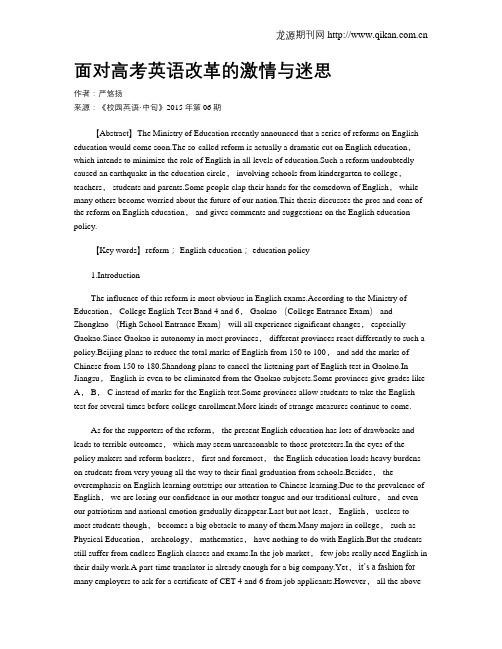
面对高考英语改革的激情与迷思作者:严悠扬来源:《校园英语·中旬》2015年第06期【Abstract】The Ministry of Education recently announced that a series of reforms on English education would come soon.The so-called reform is actually a dramatic cut on English education,which intends to minimize the role of English in all levels of education.Such a reform undoubtedly caused an earthquake in the education circle, involving schools from kindergarten to college,teachers, students and parents.Some people clap their hands for the comedown of English, while many others become worried about the future of our nation.This thesis discusses the pros and cons of the reform on English education, and gives comments and suggestions on the English education policy.【Key words】reform; English education; education policy1.IntroductionThe influence of this reform is most obvious in English exams.According to the Ministry of Education, College English Test Band 4 and 6, Gaokao (College Entrance Exam) and Zhongkao (High School Entrance Exam) will all experience significant changes, especially Gaokao.Since Gaokao is autonomy in most provinces, different provinces react differently to such a policy.Beijing plans to reduce the total marks of English from 150 to 100, and add the marks of Chinese from 150 to 180.Shandong plans to cancel the listening part of English test in Gaokao.In Jiangsu, English is even to be eliminated from the Gaokao subjects.Some provinces give grades like A, B, C instead of marks for the English test.Some provinces allow students to take the English test for several times before college enrollment.More kinds of strange measures continue to come.As for the supporters of the reform, the present English education has lots of drawbacks and leads to terrible outcomes, which may seem unreasonable to those protesters.In the eyes of the policy makers and reform backers, first and foremost, the English education loads heavy burdens on students from very young all the way to their final graduation from schools.Besides, the overemphasis on English learning outstrips our attention to Chinese learning.Due to the prevalence of English, we are losing our confidence in our mother tongue and our traditional culture, and even our patriotism and national emotion gradually st but not least, English, useless to most students though, becomes a big obstacle to many of them.Many majors in college, such as Physical Education, archeology, mathematics, have nothing to do with English.But the students still suffer from endless English classes and exams.In the job market, few jobs really need English in their daily work.A part-time translator is already enough for a big company.Yet,it’s a fashion for many employers to ask for a certificate of CET 4 and 6 from job applicants.However, all the above arguments are awfully ridiculous from the perspectives of the opponents.As far as they see, theEnglish education is used as a figleaf or basket by the supporters.They put whatever bad effects into this basket.In the following parts of this thesis, I will analyze the above reasons one by one in detail.2.Analysis2.1 More or less burden?It is universally acknowledged that almost every student in China suffers from heavy study pressure under fierce competition.English, as one of the most important subjects to learn, has become a nightmare for some students.However, whether the reform on English education will liberate them from the burden is under doubt.As long as the tight situation of college enrollment remains, fierce competition in Gaokao will continue to exist.Small adjustments on the subjects or marks in Gaokao help little.The pressure of learning English will soon be transferred to other subjects.For instance, the division of science and art in high school ra rely releases students’ burden, but makes their knowledge structure incomplete.Despite their full curriculum from Monday morning to Saturday night, those science students have no idea of our society, like economy and politics, and know little of our traditional culture, like history and philosophy, which are taught only to art students in high school.Yet, such knowledge should be crucial to every citizen.Moreover,the reforms on English test in Gaokao may otherwise increase students’ pressure as well.For instance, the cancellation of listening in test may be a bad news, since the listening comprehension, on the one hand, is the easiest part to many students.From Zhongkao to CET 6,most students agree that it is always easier to get full marks in listening than any other part.On the other hand, a new type of item in exam, more challenging to both teachers and students, may take the place of listening.Additionally, the cancellation of listening in test will undoubtedly produce more deaf and mute English learners.Meanwhile, to take the place of marks by grades seem to be worse for the imbalanced students.Before the reform, their weakness in English can be supplemented by scores from other advantaged subjects.But an isolated grade on English alone will certainly expose their deficiency.The low grade of English may not meet the requirement of college,even if their other conditions all exceed.2.2 Chinese vs.EnglishAn editorial on People’s Daily said,‘although English is an international t ool, it takes up too much proportion.The mother tongue is looked down upon.Do we go to another extreme? When a nation’s language is attacked, how can its culture be inherited? A developing China should view English scientifically and treat mother tongue co nfidently.’ However, the decline of Chinese and Chinese culture in Chinese mainland in recent decades, in fact, has nothing to do with the prevalence of English.The English education started long before the founding of People’s Republic of China, and the foreign language learning took place far earlier.In history, China had frequent communication with the outside world since 2000 years ago.The English education can be traced backto early 19th Century, when western missionaries came to China.In 1862, Qing dynasty opened the first official language school in China, called ter on, language classes prospered during the Yangwu Movement.In 1893, Zhang Zhidong set up the predecessor of Wuhan University, Ziqiangxuetang, in which English and French were taught by Chinese teachers while German and Russian were taught by foreigners.Nonetheless, our mother tongue and traditional culture has declined ever since the founding of PRC, mainly due to a series of consecutive political movements.In contrast, Chinese and Chinese culture are well preserved in Taiwan and even our neighboring countries.From the linguistic view, learning Chinese and learning English are not contradictory but complementary.For one thing, many masters of Chinese culture, from the past to now, are proficient in many languages other than their mother tongue, such as Monk Xuanzang in Tang Dynasty, Emperor Kangxi in Qing Dynasty, Qian Zhongshu, Fu Lei and Ji Xianlin.They prove that learning a foreign language also helps to improve the mother tongue.For another, our poor mother tongue competence, in its nature, originates from the present mother tongue education rather than the impact of English.Under the examination-oriented education, Chinese classes are full of cramming and preaching by the teacher,as well as students’ mechanic memorization.Students are trained to write stereotyped compositions.The extensive and profound Chinese language and culture are compressed into the so-called theme, central meaning,main idea,and so on.Students’ imagination and creativity are totally killed.Zheng Yuanjie, a famous writer, once tried to answer the 1998 Gaokao Chinese test.To his surprise, he only got 43 out of 150.Our willingness to revive our mother tongue and traditional culture should not only be presented in the rise of test scores.It’s almost useless to protect Chinese and Chinese culture by cutting down English.2.3 Useful or uselessMany regard English only as tool which is hardly used by ordinary people.However, frankly speaking, I believe English must be the most, if not the only, useful subject at basic education.Personally, I think math is the most useless, yet a compulsory subject before college.I never found any practical use of math knowledge in daily life besides simple calculation.Yet, lots of pupils are compelled to learn the Olympic Math, which is full of strange questions, in order to enter a good middle school.Some may argue that math trains one’s logic and makes onecleverer.Indeed,it’s fairly easy for Chinese to get an extraordinarily high mark on math tests in SAT and GRE.But,there’s no evidence that the Chinese are wiser than the Westerners.Besides,language and thought are closely integrated.Learning a language helps much more to train one’s thought than math.In college, politics classes are much more useless than English classes.In Kaoyan (Postgraduate Entrance Exam), politics blocks the way rather than English.Thus, I advocate that, instead of English, math should be cut down in total score in Gaokao for art students, and politics removed in Kaoyan.In reality, English gets an unprecedented status in the era of global village.English and English culture are everywhere in our daily life.The clothes we wear, the food we eat, the programs we watch on TV, the games we play on computer and so on so forth are heavily influenced and even more or less determined by the western culture.Nowhere else except in North Korea can we hide ourselves from English and English culture.In metropolitans like Beijing, Shanghai, Shenzhen,the employees in the service sector, such as tour guides, taxi drivers, receptionists, cashiers,all can speak some English.In big cities, we can frequently see foreigners on the street.I remembered when I went to Beihai Park in Beijing 7 years ago, there were so many foreigners here andthere.Even the peddlers selling drinks and snacks can speak numbers and a few phrases in English,like ‘welcome’,‘can I help you?’,‘three yuan’, etc.That was the situation 7 years ago, let alone today.The status of English all over the world becomes similar to that of Putonghua in China.Decades ago, few people can speak standard Putonghua.But now, few people speak their dialect in public places.Whether you learn English or not, the dominance of English and western culture in the world will hardly change.I feel sympathetic for those who say they find English of little use, just like I feel the same for North Koreans,who think there’s no need for them to have democracy and freedom.On the one hand,they don’t learn the language well.As a result, they deliberately avoid getting in touch with English.Even when they travel abroad, where English is heard everywhere, they still avoid speaking English.On the other hand, our country is not open enough to the outside world.We have to go through complicated procedures to go abroad.We have no access to foreign channels on TV.Many foreign websites are not available.All these limit our contact with the outside world.mentThe w ord ‘reform’ is becoming a sensitive word in the political field.A netizen says,‘In the past, we learn foreign languages in order to know the world.At present, we learn foreign languages in order to know China.’ A professor once told the class about how h e found English and German indispensable to him,‘When I look for the fact of a certain piece of news online, all websites with the sensitive word in Chinese are blocked.Then I look for it in English.But sometimes websites in English are also screened.So I look for it in German.In this way,I successfully get the news I want.’ This is an extreme case to show the importance of learning foreign languages, but to master a new foreign language will indeed open a new world for you.You’ll be amazed to find that t he world is far greater than you have expected.References:[1]Schon,D.A.1983.The Reflective Practitioner:How Professionals Think[M].Basic Books.[2]White, R.V.1988.The ELT Curriculum[M].Basil Blackwell.[3]蔡基刚.2005.大学英语教学若干问题思考[J].外语教学与研究,2:83-91.[4]曹志希.2003.认知发展:外语教育的出发点和归宿[J].外语教学,3:73-75.[5]付克.1986.中国外语教育史[M].上海:上海外语教育出版社.[6]胡文仲.2001.我国外语教育规划的得与失[J].外语教学与研究,4:245-251.作者简介:严悠扬(1991-)男,湖北武汉人,汉族,硕士,武汉大学外国语言文学学院英文系2013级硕士研究生,研究方向:语言测试、英语变体。
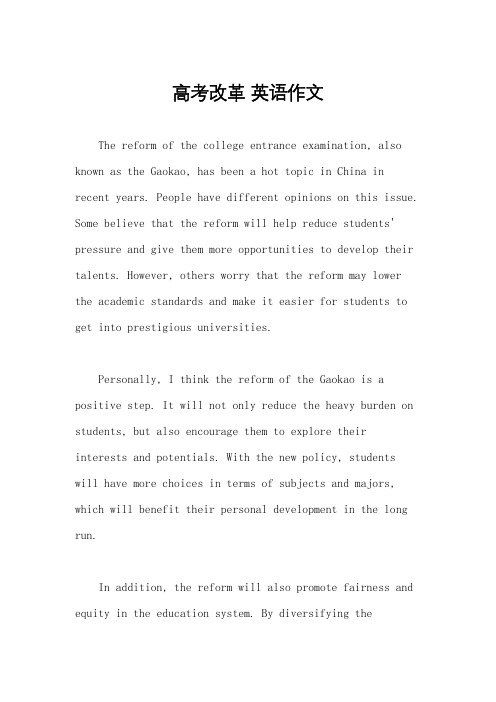
高考改革英语作文The reform of the college entrance examination, also known as the Gaokao, has been a hot topic in China in recent years. People have different opinions on this issue. Some believe that the reform will help reduce students' pressure and give them more opportunities to develop their talents. However, others worry that the reform may lower the academic standards and make it easier for students to get into prestigious universities.Personally, I think the reform of the Gaokao is a positive step. It will not only reduce the heavy burden on students, but also encourage them to explore theirinterests and potentials. With the new policy, studentswill have more choices in terms of subjects and majors, which will benefit their personal development in the long run.In addition, the reform will also promote fairness and equity in the education system. By diversifying theevaluation criteria and offering more options for students, the reform will help level the playing field for all students, regardless of their backgrounds or circumstances. This will create a more inclusive and just educational environment for everyone.Moreover, the reform will also encourage innovation and creativity in education. With the emphasis on comprehensive abilities and qualities, students will be encouraged to think critically, solve problems independently, and communicate effectively. This will not only benefit their academic performance, but also prepare them for the challenges of the real world.Overall, the reform of the Gaokao is a significant and positive change for the education system in China. It will not only reduce students' pressure, but also promote fairness, equity, and innovation in education. I believe that the reform will bring about positive outcomes for both students and the society as a whole.。

高中英语作文《高考改革方案的思考》The Reform Scheme of College Entrance Examination: My Thoughts The college entrance examination, known as 'Gaokao' in China, is a significant event in every high school student's life.It is a test that determines their future educational path and, to some extent, their life after graduation.Recently, there have been discussions about reforming the Gaokao system.In this essay, I would like to share my thoughts on the possible reform scheme of the college entrance examination.First and foremost, I believe that the current Gaokao system is too examination-oriented.It emphasizes the importance of grades in exams rather than overall development of students.As a result, students are pressured to focus solely on studying for the exam, neglecting other important aspects of their lives, such as extracurricular activities and social skills.Therefore, I think the reform scheme should emphasize a more holistic evaluation of students.One possible solution is to introduce a comprehensive assessment system that takes into account not only academic performance but also extracurricular activities, volunteering experience, and personal qualities.This would encourage students to develop a well-rounded personality and not just focus on excelling in exams.Additionally, it would allow students with different talents and interests to showcase their abilities and be recognized accordingly.Another aspect that needs reform is the subject structure of the Gaokao.Currently, students are required to take the same set of subjects regardless of their interests and future career plans.This one-size-fits-all approach does not cater to the individuality of students.Therefore, I propose that the reform scheme should allow students to choose subjects that align with their interests and strengths.This would not only make the examination process more fair but also motivate students to learn more effectively.Furthermore, the reform scheme should address the issue of high pressure and stress associated with the Gaokao.The examination is known to cause immense stress to students, parents, and teachers alike.To alleviate this, the examination should be scheduled at a more convenient time, and proper mental health support should be provided to students.In conclusion, the reform of the Gaokao system is long overdue.The current examination-oriented system does not adequately prepare students for the diverse challenges of the real world.A more comprehensive and individualized assessment approach, along with a revised subject structure and stress management, would better serve the needs of students and society.I hope that policymakers will take these suggestions into consideration and work towards creating a more equitable and effective college entrance examination system.。

关于新高考看法的英语作文I think the new college entrance examination system has both advantages and disadvantages. On the one hand, it allows students to choose subjects that they are interested in and excel at, which can help them develop their talents and potential. On the other hand, it may also put pressure on students to specialize too early and limit their overall knowledge and skills.The emphasis on comprehensive assessment in the new college entrance examination system is a positive change.It encourages students to develop a well-rounded set of skills and knowledge, rather than just focusing on memorization and test-taking strategies. This can better prepare students for the challenges of the future and help them become more versatile and adaptable individuals.However, the new college entrance examination system may also lead to increased competition among students, as they strive to excel in a narrower range of subjects. Thiscan create a stressful and high-pressure environment for students, which may not be conducive to their overall well-being and mental health. It is important for educators and policymakers to consider the impact of these changes on students and provide support and resources to help them cope with the challenges they may face.In conclusion, while the new college entrance examination system has its benefits, it also has its drawbacks. It is important for educators, parents, and students to work together to ensure that the system is implemented in a way that supports the holistic development of students and prepares them for success in the future.。
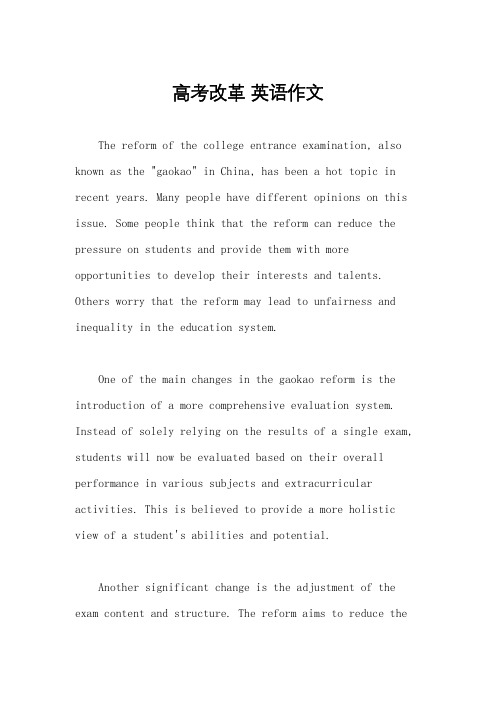
高考改革英语作文The reform of the college entrance examination, also known as the "gaokao" in China, has been a hot topic in recent years. Many people have different opinions on this issue. Some people think that the reform can reduce the pressure on students and provide them with more opportunities to develop their interests and talents. Others worry that the reform may lead to unfairness and inequality in the education system.One of the main changes in the gaokao reform is the introduction of a more comprehensive evaluation system. Instead of solely relying on the results of a single exam, students will now be evaluated based on their overall performance in various subjects and extracurricular activities. This is believed to provide a more holistic view of a student's abilities and potential.Another significant change is the adjustment of the exam content and structure. The reform aims to reduce theemphasis on rote memorization and encourage critical thinking and creativity. This is expected to better prepare students for the challenges of the modern world and foster a more innovative and entrepreneurial spirit.However, there are also concerns about the potential drawbacks of the gaokao reform. Some people worry that the new evaluation system may favor students from privileged backgrounds who have more access to resources and opportunities. This could exacerbate the existinginequality in the education system and limit the upward mobility of disadvantaged students.In conclusion, the reform of the college entrance examination in China has sparked a heated debate. While it is intended to alleviate the pressure on students and promote a more well-rounded education, there are also concerns about fairness and equality. It remains to be seen how the reform will be implemented and what impact it will have on the future of education in China.。

关于高考改革英语作文The reform of the college entrance examination, also known as the Gaokao, has been a hot topic in China in recent years. Many people have different opinions on this issue. Some believe that the reform can reduce the pressure on students and promote fair competition, while others argue that it may lower the overall quality of education.The new Gaokao reform includes a comprehensive evaluation system, which takes into account not only students' academic performance but also their overall development. This means that students will be evaluated based on their performance in various subjects, as well as their extracurricular activities and personal qualities.Some people worry that the new reform may lead to a decrease in the academic level of students. They believe that by focusing on students' overall development, the new system may neglect the importance of academic excellence. However, supporters of the reform argue that the newevaluation system can better reflect students' comprehensive abilities and reduce the emphasis on rote memorization.In addition, the reform also aims to reduce thepressure on students by offering more flexible exam options. For example, students can choose to take different subjects according to their interests and career goals. This canhelp students to pursue their passions and develop their strengths, rather than being forced to study subjects they are not interested in.Overall, the Gaokao reform has sparked a heated debatein China. While some people are concerned about thepotential drawbacks of the new system, others believe thatit can bring positive changes to the education system. It remains to be seen how the reform will impact students' academic performance and overall development in the future.。
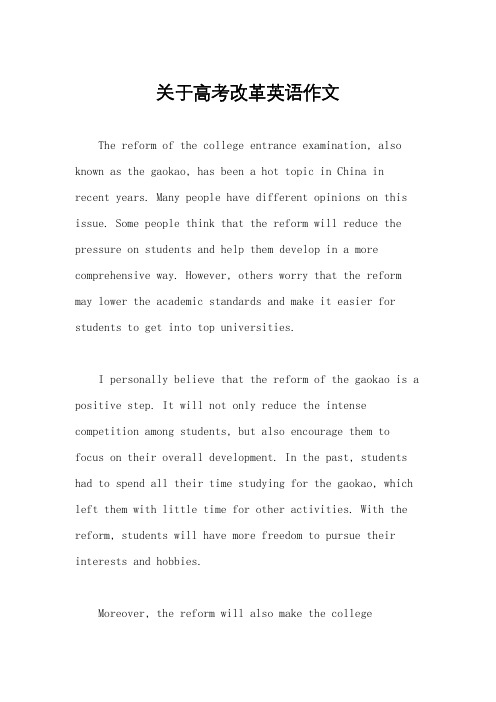
关于高考改革英语作文The reform of the college entrance examination, also known as the gaokao, has been a hot topic in China in recent years. Many people have different opinions on this issue. Some people think that the reform will reduce the pressure on students and help them develop in a more comprehensive way. However, others worry that the reform may lower the academic standards and make it easier for students to get into top universities.I personally believe that the reform of the gaokao is a positive step. It will not only reduce the intense competition among students, but also encourage them to focus on their overall development. In the past, students had to spend all their time studying for the gaokao, which left them with little time for other activities. With the reform, students will have more freedom to pursue their interests and hobbies.Moreover, the reform will also make the collegeentrance examination more fair and just. In the past, students from rural areas or less developed regions often had fewer educational resources and opportunities, which put them at a disadvantage in the gaokao. With the reform, students will be evaluated based on their overall performance, rather than just their test scores.Of course, there are also challenges and concerns associated with the reform. For example, some people worry that the new system may be more subjective and lead to favoritism. It is important for the authorities to ensure that the new system is fair and transparent, and that all students have an equal opportunity to succeed.In conclusion, the reform of the gaokao is a positive change that will benefit students and the education system as a whole. It will reduce the pressure on students, promote their overall development, and make the college entrance examination more fair and just. However, it is important to address the challenges and concerns associated with the reform to ensure its success.。
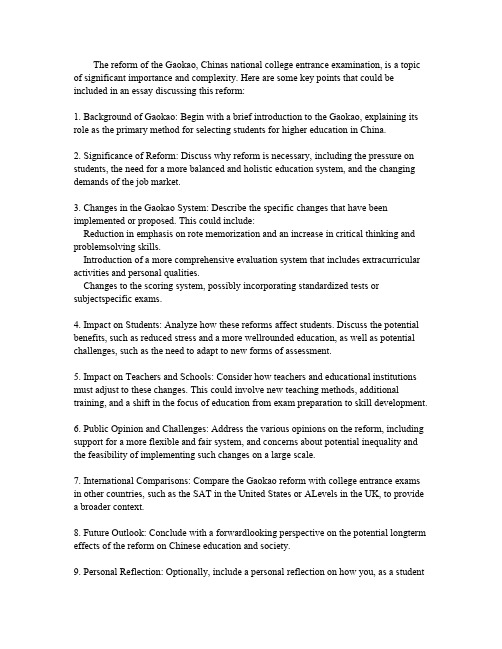
The reform of the Gaokao,Chinas national college entrance examination,is a topic of significant importance and complexity.Here are some key points that could be included in an essay discussing this reform:1.Background of Gaokao:Begin with a brief introduction to the Gaokao,explaining its role as the primary method for selecting students for higher education in China.2.Significance of Reform:Discuss why reform is necessary,including the pressure on students,the need for a more balanced and holistic education system,and the changing demands of the job market.3.Changes in the Gaokao System:Describe the specific changes that have been implemented or proposed.This could include:Reduction in emphasis on rote memorization and an increase in critical thinking and problemsolving skills.Introduction of a more comprehensive evaluation system that includes extracurricular activities and personal qualities.Changes to the scoring system,possibly incorporating standardized tests or subjectspecific exams.4.Impact on Students:Analyze how these reforms affect students.Discuss the potential benefits,such as reduced stress and a more wellrounded education,as well as potential challenges,such as the need to adapt to new forms of assessment.5.Impact on Teachers and Schools:Consider how teachers and educational institutions must adjust to these changes.This could involve new teaching methods,additional training,and a shift in the focus of education from exam preparation to skill development.6.Public Opinion and Challenges:Address the various opinions on the reform,including support for a more flexible and fair system,and concerns about potential inequality and the feasibility of implementing such changes on a large scale.7.International Comparisons:Compare the Gaokao reform with college entrance exams in other countries,such as the SAT in the United States or ALevels in the UK,to providea broader context.8.Future Outlook:Conclude with a forwardlooking perspective on the potential longterm effects of the reform on Chinese education and society.9.Personal Reflection:Optionally,include a personal reflection on how you,as a studentor observer,view the reform and its implications.10.Call to Action:End with a call to action,encouraging continued dialogue,support for educational innovation,and a commitment to improving the Gaokao system for the benefit of all students.Remember to structure your essay with a clear introduction,body paragraphs that explore each point in depth,and a conclusion that summarizes your main arguments and leaves a lasting impression on the reader.。
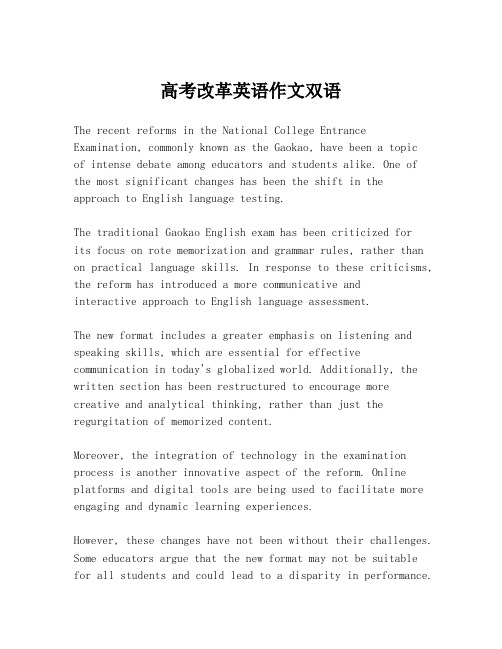
高考改革英语作文双语The recent reforms in the National College Entrance Examination, commonly known as the Gaokao, have been a topicof intense debate among educators and students alike. One of the most significant changes has been the shift in the approach to English language testing.The traditional Gaokao English exam has been criticized forits focus on rote memorization and grammar rules, rather than on practical language skills. In response to these criticisms, the reform has introduced a more communicative andinteractive approach to English language assessment.The new format includes a greater emphasis on listening and speaking skills, which are essential for effective communication in today's globalized world. Additionally, the written section has been restructured to encourage more creative and analytical thinking, rather than just the regurgitation of memorized content.Moreover, the integration of technology in the examination process is another innovative aspect of the reform. Online platforms and digital tools are being used to facilitate more engaging and dynamic learning experiences.However, these changes have not been without their challenges. Some educators argue that the new format may not be suitable for all students and could lead to a disparity in performance.Others express concerns about the feasibility of implementing such reforms on a large scale.Despite these concerns, the overall sentiment is that the reform is a step in the right direction. It aims to better prepare students for the demands of the modern world and to cultivate a more well-rounded understanding of the English language.In conclusion, the reform of English in the Gaokao is a reflection of the evolving educational landscape. It seeks to move away from a rigid, exam-focused approach to a more holistic and practical method of language learning.双语作文近年来,全国高考改革一直是教育界激烈讨论的话题。
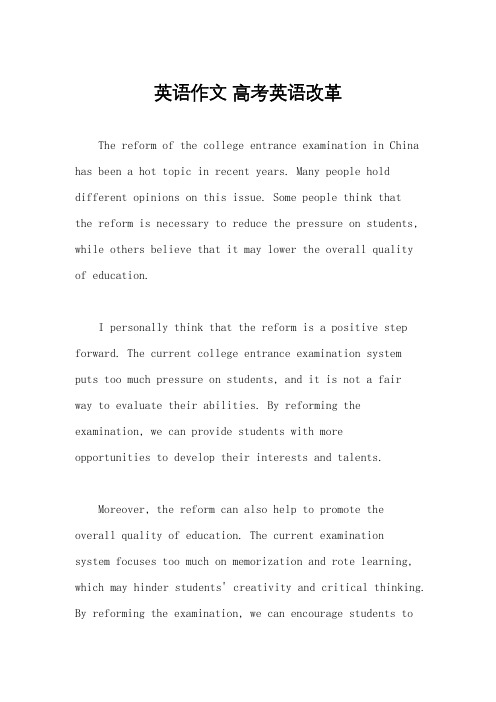
英语作文高考英语改革The reform of the college entrance examination in China has been a hot topic in recent years. Many people hold different opinions on this issue. Some people think thatthe reform is necessary to reduce the pressure on students, while others believe that it may lower the overall qualityof education.I personally think that the reform is a positive step forward. The current college entrance examination system puts too much pressure on students, and it is not a fairway to evaluate their abilities. By reforming the examination, we can provide students with moreopportunities to develop their interests and talents.Moreover, the reform can also help to promote theoverall quality of education. The current examinationsystem focuses too much on memorization and rote learning, which may hinder students' creativity and critical thinking. By reforming the examination, we can encourage students tothink independently and creatively.However, it is also important to note that the reform should be carried out carefully. We need to consider the potential impact of the reform on students, teachers, and schools. It is essential to provide necessary support and guidance to ensure a smooth transition.In conclusion, I believe that the reform of the college entrance examination is a positive step forward. It can help to reduce the pressure on students, promote theoverall quality of education, and encourage students to think independently and creatively. However, we need to carry out the reform carefully to minimize the potential negative impact.。

高考英语改革英语作文The reform of the Gaokao, China's national college entrance examination, has been a topic of significant debate and discussion in recent years. One of the key areas of focus within this reform has been the English composition section, which aims to better assess students' practical language skills and their ability to communicate effectively in English.Changes in the Format:Traditionally, the Gaokao English essay has been a short written response to a given prompt, often requiring students to express opinions or describe scenarios. However, with the reform, there is a shift towards more open-ended questions that encourage critical thinking and the ability to construct well-reasoned arguments.Emphasis on Practical Skills:The new format places a greater emphasis on practical language use, including the ability to understand and respond to different types of texts, such as emails, articles, and narratives. This reflects a move away from rote memorization and towards a more functional approach to language learning.Integration of Technology:With the advent of computer-based testing in some regions, the reform also incorporates the use of technology in the assessment process. This could mean typing essays on acomputer, which adds an additional layer of skill requiredfor the examination.Impact on Teaching and Learning:Teachers are now encouraged to adopt more interactive and communicative methods in the classroom. This includes engaging students in discussions, debates, and collaborative writing activities to prepare them for the new style of essay writing.Preparation Strategies:Students are advised to broaden their reading materials to include a variety of genres and to practice writing essays that require analysis and synthesis of information. They should also become familiar with typing essays efficiently to meet the demands of computer-based testing.Challenges and Opportunities:The reform presents challenges such as the need for updated teaching materials and training for teachers to adapt to the new requirements. However, it also offers opportunities for students to develop a more nuanced and versatile command of the English language.Conclusion:The reform of the Gaokao English composition section is a step towards aligning the examination with real-world language use and international standards. It is designed to produce graduates who are not only proficient in English but also capable of using it effectively in various professional and academic contexts. As with any significant change, itrequires a period of adjustment for both educators and students, but the long-term benefits are expected to be significant in fostering a more competent and confident generation of English speakers in China.。
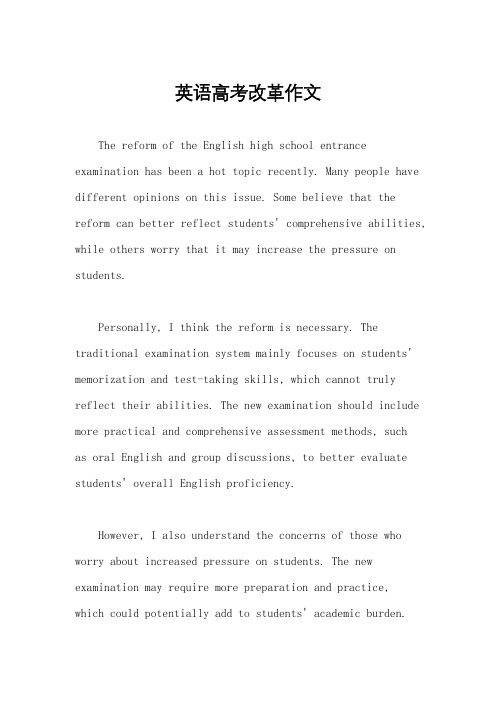
英语高考改革作文The reform of the English high school entrance examination has been a hot topic recently. Many people have different opinions on this issue. Some believe that the reform can better reflect students' comprehensive abilities, while others worry that it may increase the pressure on students.Personally, I think the reform is necessary. The traditional examination system mainly focuses on students' memorization and test-taking skills, which cannot truly reflect their abilities. The new examination should include more practical and comprehensive assessment methods, suchas oral English and group discussions, to better evaluate students' overall English proficiency.However, I also understand the concerns of those who worry about increased pressure on students. The new examination may require more preparation and practice,which could potentially add to students' academic burden.Therefore, it is important for the education authorities to provide necessary support and guidance to help students adapt to the new examination system.In addition, the reform should also take into consideration the fairness and equality of the examination. It is crucial to ensure that all students have equal opportunities to prepare for the examination, regardless of their backgrounds or resources. The examination should not become a tool for further widening the gap between students from different social and economic backgrounds.In conclusion, the reform of the English high school entrance examination is a complex and challenging task. It requires careful planning and consideration of various factors. While the new examination system may bring about some challenges, it also holds the potential to better assess students' abilities and promote a more comprehensive English education.。
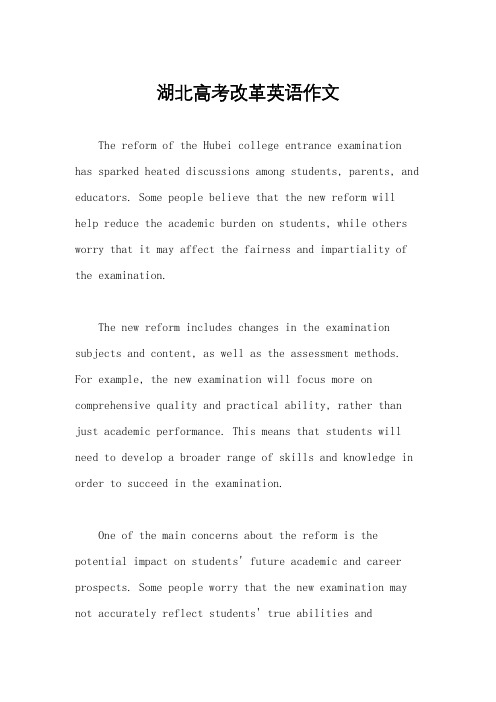
湖北高考改革英语作文The reform of the Hubei college entrance examination has sparked heated discussions among students, parents, and educators. Some people believe that the new reform will help reduce the academic burden on students, while others worry that it may affect the fairness and impartiality of the examination.The new reform includes changes in the examination subjects and content, as well as the assessment methods. For example, the new examination will focus more on comprehensive quality and practical ability, rather than just academic performance. This means that students will need to develop a broader range of skills and knowledge in order to succeed in the examination.One of the main concerns about the reform is the potential impact on students' future academic and career prospects. Some people worry that the new examination may not accurately reflect students' true abilities andpotential, leading to unfair outcomes in college admissions and future job opportunities.On the other hand, supporters of the reform argue that the current examination system puts too much pressure on students and encourages rote learning rather than critical thinking and creativity. They believe that the new reform will help promote a more holistic and balanced education system, where students can develop their full potential and pursue their interests and passions.Overall, the reform of the Hubei college entrance examination is a complex and controversial issue that requires careful consideration and thoughtful discussion. While the new reform may bring about positive changes in the education system, it is important to address the concerns and challenges that may arise during the implementation process.。
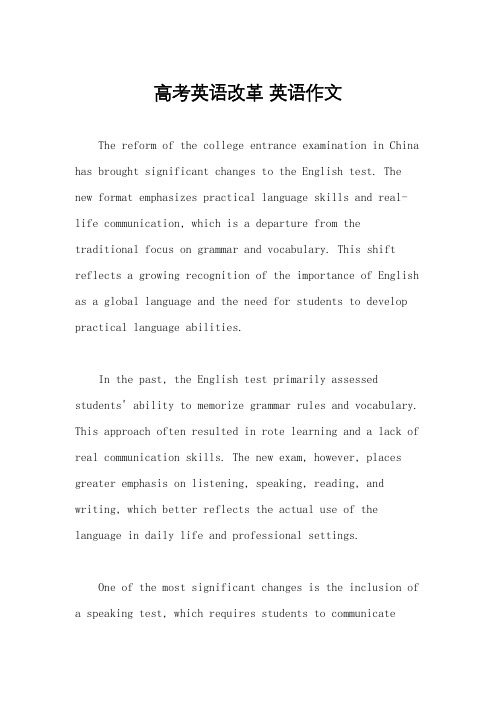
高考英语改革英语作文The reform of the college entrance examination in China has brought significant changes to the English test. The new format emphasizes practical language skills and real-life communication, which is a departure from thetraditional focus on grammar and vocabulary. This shift reflects a growing recognition of the importance of English as a global language and the need for students to develop practical language abilities.In the past, the English test primarily assessed students' ability to memorize grammar rules and vocabulary. This approach often resulted in rote learning and a lack of real communication skills. The new exam, however, places greater emphasis on listening, speaking, reading, and writing, which better reflects the actual use of the language in daily life and professional settings.One of the most significant changes is the inclusion of a speaking test, which requires students to communicatetheir ideas and opinions on various topics. This not only assesses their oral communication skills but also encourages them to think critically and express themselves confidently. Additionally, the reading and writing sections have been redesigned to focus on comprehension and expression, rather than just testing knowledge of grammar and vocabulary.The reform has also led to a shift in teaching methods, with more emphasis on practical language use and communication. Teachers are encouraged to create a more interactive and communicative classroom environment, where students can practice using English in real-life situations. This approach not only helps students prepare for the new exam but also equips them with valuable language skills for their future studies and careers.Overall, the reform of the college entrance examination has brought about positive changes in the way English is taught and tested in China. By prioritizing practical language skills and real-life communication, the new exam format better prepares students for using English in theglobal context and helps them develop essential language abilities for their future endeavors.。
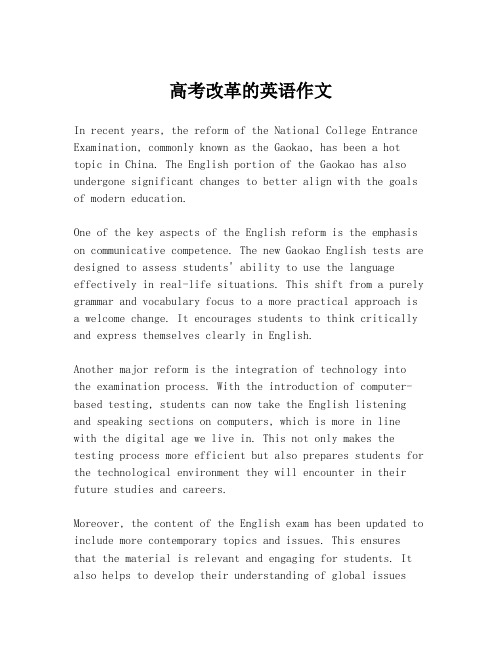
高考改革的英语作文In recent years, the reform of the National College Entrance Examination, commonly known as the Gaokao, has been a hot topic in China. The English portion of the Gaokao has also undergone significant changes to better align with the goals of modern education.One of the key aspects of the English reform is the emphasis on communicative competence. The new Gaokao English tests are designed to assess students' ability to use the language effectively in real-life situations. This shift from a purely grammar and vocabulary focus to a more practical approach is a welcome change. It encourages students to think critically and express themselves clearly in English.Another major reform is the integration of technology into the examination process. With the introduction of computer-based testing, students can now take the English listening and speaking sections on computers, which is more in line with the digital age we live in. This not only makes the testing process more efficient but also prepares students for the technological environment they will encounter in their future studies and careers.Moreover, the content of the English exam has been updated to include more contemporary topics and issues. This ensuresthat the material is relevant and engaging for students. It also helps to develop their understanding of global issuesand their ability to discuss them in English.The reform has also introduced a more balanced approach to assessment, with a greater focus on continuous evaluation rather than a single high-stakes exam. This helps to reduce the pressure on students and encourages a more holistic approach to learning English.In conclusion, the reform of the Gaokao English exam is a positive step towards creating a more well-rounded and practical English education in China. It not only prepares students for the demands of the modern world but also fosters a love for the English language and its rich cultural heritage.。
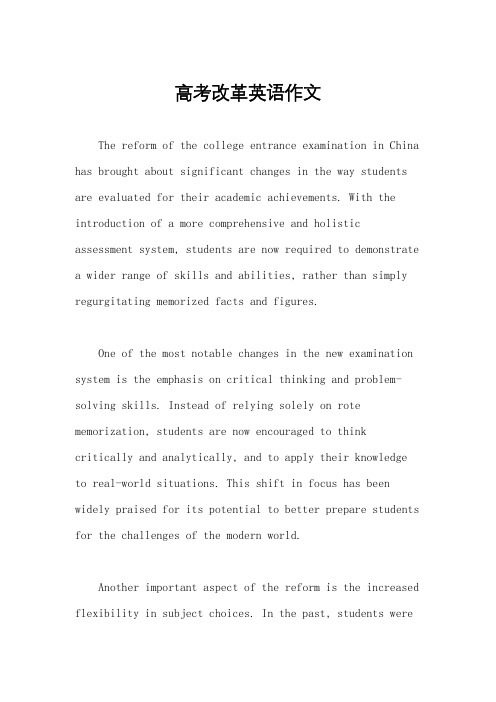
高考改革英语作文The reform of the college entrance examination in China has brought about significant changes in the way students are evaluated for their academic achievements. With the introduction of a more comprehensive and holistic assessment system, students are now required to demonstrate a wider range of skills and abilities, rather than simply regurgitating memorized facts and figures.One of the most notable changes in the new examination system is the emphasis on critical thinking and problem-solving skills. Instead of relying solely on rote memorization, students are now encouraged to thinkcritically and analytically, and to apply their knowledge to real-world situations. This shift in focus has been widely praised for its potential to better prepare students for the challenges of the modern world.Another important aspect of the reform is the increased flexibility in subject choices. In the past, students wererequired to take a fixed set of subjects, regardless of their individual interests and strengths. Now, students have the freedom to choose subjects that align with their personal goals and aspirations, allowing them to pursue their passions and develop their talents in a more personalized way.Furthermore, the new examination system places a greater emphasis on practical skills and abilities, such as communication, teamwork, and creativity. This reflects a growing recognition of the importance of these skills in the 21st century, where success often depends on one's ability to collaborate with others and think outside the box.Overall, the reform of the college entrance examination in China represents a positive step towards a more modern and effective education system. By placing greater emphasis on critical thinking, flexibility, and practical skills, the new system has the potential to better prepare students for the challenges and opportunities of the future.。
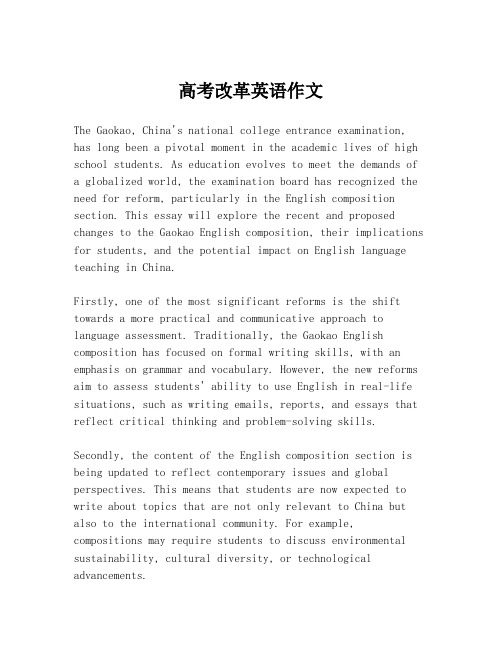
高考改革英语作文The Gaokao, China's national college entrance examination, has long been a pivotal moment in the academic lives of high school students. As education evolves to meet the demands of a globalized world, the examination board has recognized the need for reform, particularly in the English composition section. This essay will explore the recent and proposed changes to the Gaokao English composition, their implications for students, and the potential impact on English language teaching in China.Firstly, one of the most significant reforms is the shift towards a more practical and communicative approach to language assessment. Traditionally, the Gaokao English composition has focused on formal writing skills, with an emphasis on grammar and vocabulary. However, the new reforms aim to assess students' ability to use English in real-life situations, such as writing emails, reports, and essays that reflect critical thinking and problem-solving skills.Secondly, the content of the English composition section is being updated to reflect contemporary issues and global perspectives. This means that students are now expected to write about topics that are not only relevant to China but also to the international community. For example, compositions may require students to discuss environmental sustainability, cultural diversity, or technological advancements.Thirdly, the assessment criteria are being revised to place a greater emphasis on originality, coherence, and the ability to convey complex ideas effectively. This move away from the rote memorization of set phrases and templates is designed to encourage students to think independently and express their thoughts creatively.The implications of these reforms for students are profound. Students are now required to develop a broader range of language skills, including listening, speaking, reading, and writing. They must also become more adept at using English as a tool for communication and critical analysis, rather than simply as a subject to be studied.For English language teachers in China, the reforms present both challenges and opportunities. Teachers will need to adapt their teaching methods to focus on developing students' communicative competence and cultural awareness. This may involve incorporating more interactive and student-centered activities into the classroom, as well as using authentic materials that reflect a variety of accents and dialects.The potential impact on English language teaching is significant. As the Gaokao is a major driver of educational policy and practice, the reforms are likely to lead to ashift in the way English is taught and assessed across the country. This could result in a more holistic and engaging approach to language learning, which prepares students not only for higher education but also for the demands of the21st-century workforce.In conclusion, the reforms in the Gaokao English composition section represent a positive step towards a more comprehensive and relevant assessment of students' English language abilities. By focusing on practical skills, contemporary content, and original expression, the reformsaim to better prepare students for the challenges and opportunities of the globalized world. It is crucial for educators to embrace these changes and support students in developing the skills and knowledge they will need to succeed.。
